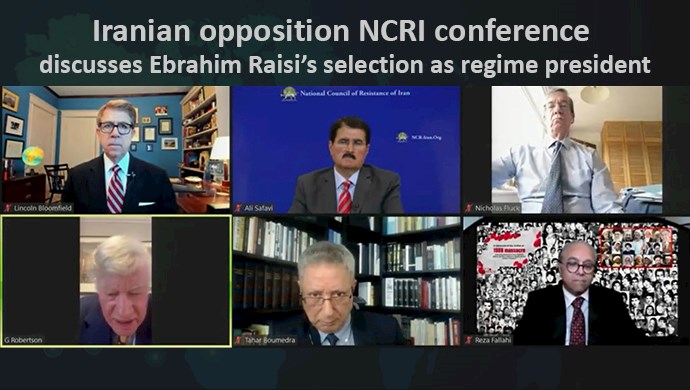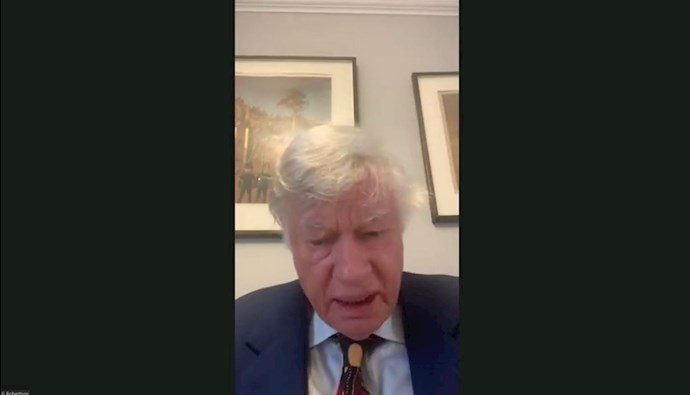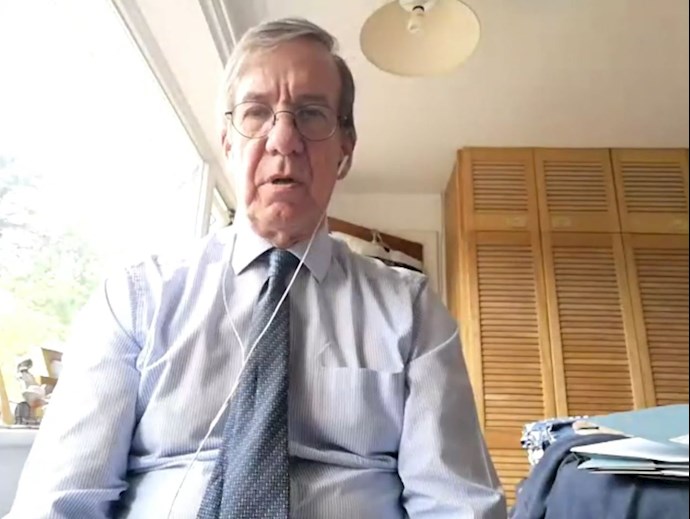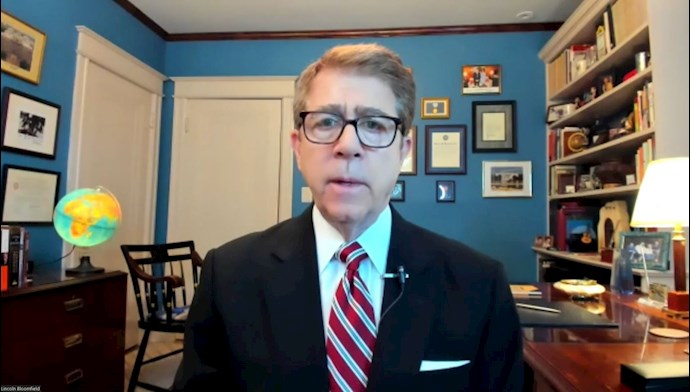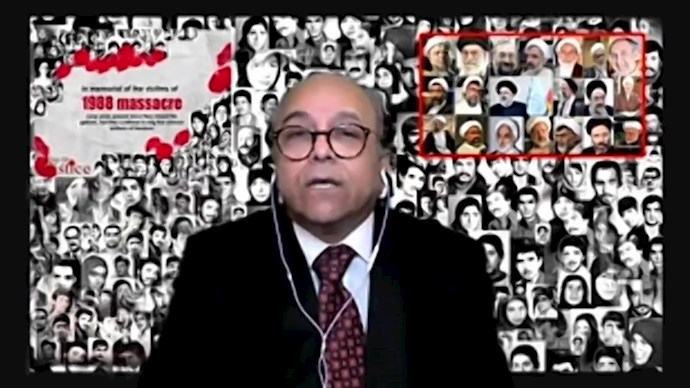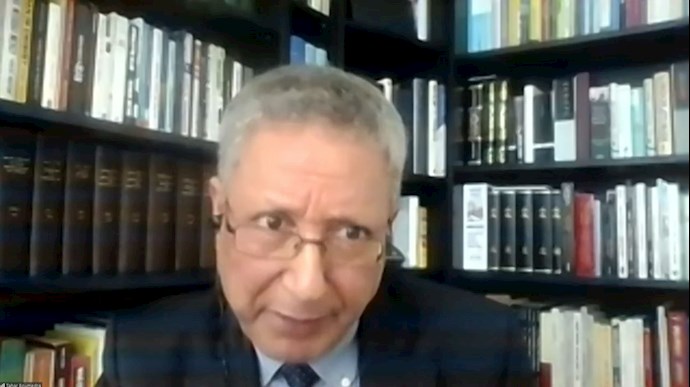Reporting by PMOI/MEK
June 24, 2021—In an online conference held on Thursday by the National Council of Resistance of Iran (NCRI), human rights experts and jurists weighed in on the implications of Ebrahim Raisi becoming the Iranian regime’s president, and the role that the international community must play to hold the regime’s authorities to account for their crimes.
The outcome of the June 18 sham presidential election in Iran was the selection of Raisi as the regime’s next president. The international community reacted with outrage, mostly due to Raisi’s direct role in summer 1988 massacre of over 30,000 political prisoners across the country.
Raisi was a member of the four-man “Death Commissions” responsible for determining the fate of prisoners throughout Iran in kangaroo trials that lasted a few minutes. These “trials” were part of a nationwide a process that was neither fair nor free, and best described in one word as a travesty.
The regime’s elections charade also faced a massive cross-country boycott by the overwhelming majority of the Iranian people. Reports provided by more than 1,200 observers backed by more than 3,500 video clips from 400 cities confirm that less than ten percent of Iran’s eligible voters actually cast their ballots. The Iranian people have made it crystal clear that they seek nothing less than regime change in Iran by the people of Iran.
“As you are already aware, on Friday, Ebrahim Raisi was installed as the next president of the Iranian regime,” Ali Safavi, a member of the Foreign Affairs Committee of the NCRI, said in his opening remarks. “This development was of course met with international outrage not least because someone whom the Iranian people have dubbed as the henchman of the 1988 massacre, when 30,000 political prisoners were sent to the gallows by the death commissions in kangaroo trials that lasted a few minutes in which Raisi was a member, was propelled to presidency in a process that was neither fair nor free. It was in one word a travesty.”
Safavi stressed that, out of desperation and faced with an exploding society, regime supreme leader Ali Khamenei engineered the ascension of someone who is described as one of the worst criminals and murderers in modern history.
“He is in reality the poster child of the religious tyranny which rules Iran today. Raisi’s ascension also put an end to the fallacious ‘moderate vs hardliner’ narrative, which the Iranian people had debunked in their chants of ‘hardliner, reformer, the game is now over’ during the four nationwide uprising since 2017,” he said.
Geoffrey Robertson, QC, is a human rights barrister, academic and author. Mr. Robertson was a UN appeal judge and President of the War Crimes Court in Sierra Leone from 2002-2007
This was indeed one of the greatest crimes against humanity, certainly the worst committed against prisoners since the World War II. These kangaroo courts were not even courts at all. Raisi was one of the key figures of these trials.
He was 28 at the time. He was the deputy prosecutor of Tehran. It was simply a body that directed people to the gallows if they were not prepared to renounce their opposition. Raisi’s guilt is not only a matter of public record. He has admitted that he was a member of death committee.
In addition to a crime against humanity, this might even be a genocide. This was an unlawful exercise of state power.
The United Nations has a bad conscience on this. At the time Amnesty International alerted about the massacre, but the UN turned a blind eye on the matter. The rapporteur for Iran was a naïve diplomat who didn’t pursue the allegations for several years. The UN has a duty to set up a proper inquiry ito these barbaric acts in 1988.
The UN will have to grapple with the fact that one of its members is led by an international criminal. Diplomats will have to be careful. They must never shake the bloody hands of this criminal. His presence in any international forum will damage that forum. It poses a problem that should first be addressed by the UN. They should go back and reexamine the events of 1988, the lies of Iran’s representative, and the role of Raisi in one of the worst crimes against humanity since the war.
Nick Fluke is a distinguished High Street Solicitor, and the President Emeritus of the Law Society of England and Wales, in which he has been a member for 16 years.
Raisi said on record that he was proud of his role in the massacre of political prisoners. This should be a wakeup call for all of us. We should not remain silent.
I understand that this is a leader who will be—I hope—shunned. There will be a lack of credibility to whatever he says.
When he announced his candidacy, he promised to fight poverty, corruption, discrimination. How do you square that with his past? He can’t be a champion against corruption. It’s interesting that dissidents urged voters to boycott. He even won the election with a very low turnout.
Can you take a prisoner who has already been tried and retry them? These were prisoners who were already in the custody of the state. There’s a huge legal problem with that. It appears that the death committee was simply performing a cleansing operation against people who were vociferous against the regime.
Iran has the second-highest number of executions, second only to China.
Somebody who is both a churchman, a statesman, and a judge funded by the state is very hard to dislodge. I applaud the efforts of the NCRI. I know there is massive concern on what is happening in this regime.
Ambassador Lincoln Bloomfield Jr. is Chairman Emeritus at the Stimson Center. He served as a national security official in the administrations of President Reagan, George H.W. Bush and G.W. Bush. Mr. Bloomfield was former Assistant Secretaries of State and Defense as well.
What issues does the Raisi presidency raise for the international community? What policy should governments follow now that there is no prospect for rapprochement with the mullahs? What should the future be for Iran as a state in the international community?
My message is that these are not new questions. They’ve been relevant for years. The West has failed to face the reality. Let us be clear. The founder of the regime, Ayatollah Khomeini, and his successor, Ayatollah Khamenei, are both major human rights violators.
In 43 years since the revolution, Khomeini founded the religious dictatorship and then handed his job to Ali Khamenei. Khamenei didn’t have religious credentials but was reliable to keep the regime in power. And now Raisi is even more reliable to crack down on dissent.
But since 2017, under the so-called moderate president Rouhani, Raisi has been putting people in jail. Raisi’s role has continued since the 1988 massacre before our eyes. This regime is trying to hang on to power at the expense of legitimacy.
The Iran watchers in Washington are very confused. They think Raisi’s presidency will result in a quick return to the nuclear deal. They have been living in an illusion. You’re now seeing a relatively young apparatchik becoming president and getting ready to become the next supreme leader. This is a man who is there simply to perpetuate a dictatorial religious regime. The western media has been reduced to say this is a change and this is an ultraconservative president. But where was the choice in this election?
We have two questions? First, what should the world do with Ebrahim Raisi? And second, what do we do with a hostile and destructive Islamic Republic? It’s not just about Raisi. His election has only clarified the negative trend we’ve seen.
Reza Fallahi is a former political prisoner who resides in London
I was arrested in September 1981 for supporting the People’s Mojahedin Organization of Iran and I was released in 1991. I am one of the few survivors of the massacre, for which the planning began in late 1987 and early 1988. I remember when Iran’s regime accepted the 1988 resolution in the United Nations, a senior official said the fate of political prisoners will be reviewed soon.
The actual prosecution process began in July 1988 for prisoners in their “red category.” None of prisoners summoned returned. Ebrahim Raisi displayed particular hostility towards me and my cellmates. They asked in affiliation with which political organization were we arrested, do we believe in the Islamic Republic, are we willing to repent, and so forth.
Overall, only 12 people survived in our ward.
As a former political prisoner, I am concerned about the recurrence of the events of the summer of 1988. To stop the regime from committing another massacre the international community, in particular the United Nations, must end the culture of impunity and launch an independent investigation into the massacre and bring people like Raisi to account.
Raisi became the president due to his unquestioning obedience to Khamenei and his penchant to murder with impunity and suppress the dissidents.
I would like to take the opportunity to announce that I am one of the individuals who will file a complaint against Raisi in the UK. I can assure you that We will continue our legal endeavor until we bring him to justice.
The international community must promise the Iranian people that they stand by the Iranian people in support of their basic aspirations, and that the world today is not a safe place for the murderers of political prisoners and the suffering people.
The international community is facing a great test today, and the Iranian people are anxiously waiting to see what the international community will do to a savage and inhuman killer. Will western countries and the United Nations remain silent like they did during the 1988 massacre? Or this time the criminals will be dealt decisively and will made to pay for their crimes against humanity?
Thahar Boumedra, international human rights lawyer and coordinator of “Justice for the Victims of the 1988 Massacre of Political Prisoners in Iran (JVMI)
From now on, states and the human rights mechanism of the UN must stop calling on Iran to investigate the 1988 massacre.
We must call for an independent international investigation into the 1988 massacre.
What about Ebrahim Raisi? He has played a key role in the 1988 massacre. He was deputy prosecutor general of Tehran and a member of the death committee.
In 2017, Hassan Rouhani confronted Raisi during the campaign and told him, “You know nothing… all you know is how to torture and execute.”
In the recent campaign, Raisi admitted his role in the mass executions and said as a judge or prosecutor he has to defend the rights of the society. This is a way of justifying his role in the 1988 massacre.
In this situation, JVMI is joining its voice to Amnesty International, and we are calling for Ebrahim Raisi to be investigated for his role in past and ongoing crimes against humanity and for the international tribunals to bring him to justice.
Head of states might claim immunity. But we are not going to wait till immunity is removed from Raisi to act. We are going to act, and we are going to put this situation toward the British system. It will be discussed among lawyers. As far as JVMI is concerned, I have the procedures to follow. It is difficult when it comes to heads of state, but for those who are not heads of state, the British judiciary allows extraterritorial trials.
When it comes to Raisi, this kind of complaints will make his life difficult. He will have to negotiate his immunity whenever he wants to travel. The evidence is ready. First of all, there are confessions made by the prosecutors themselves. And JVMI has many other documents.
We strongly believe that Raisi’s place is not to run a state or be a president. His place is in fact in Evin prison or in the detention facility in the Hague.


